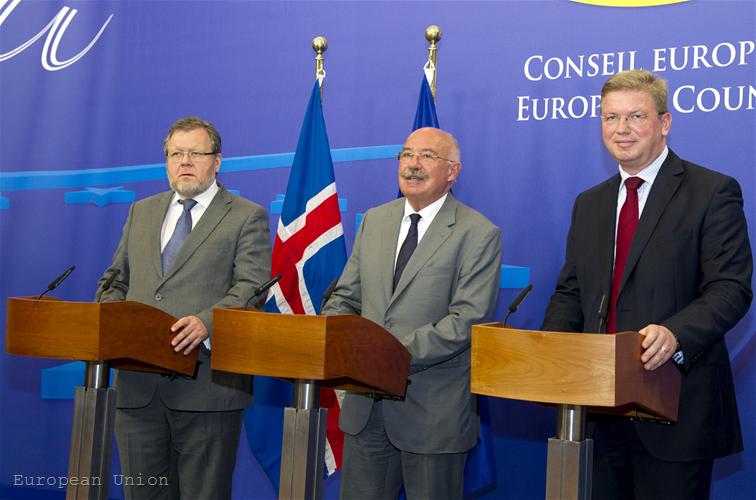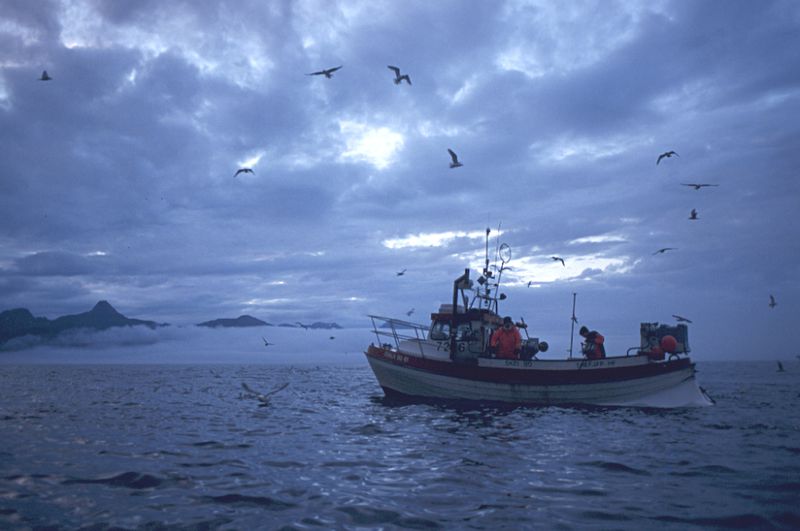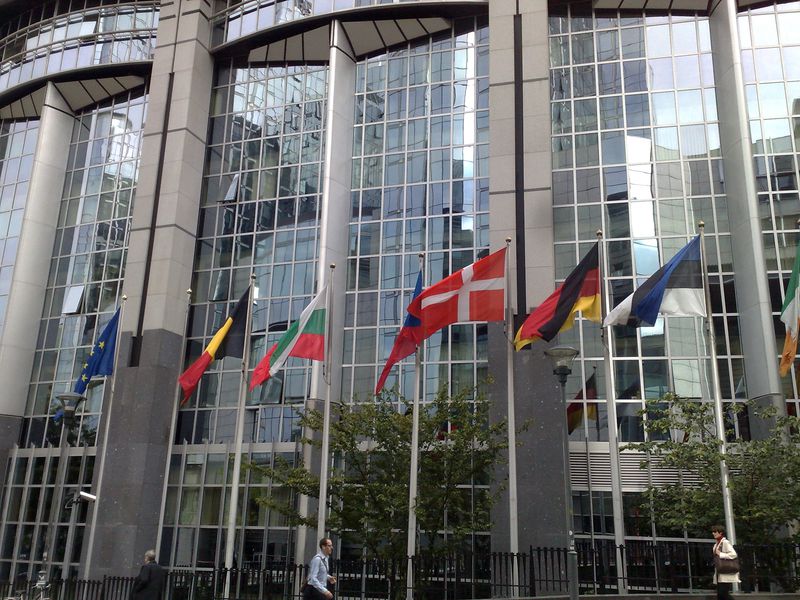Iceland is no longer certain whether it wants to join the EU
Adelina Marini, November 29, 2010
 The European Union is living through tough times which again raise the question - is this type of organisation able to withstand global pressure? The question is extremely important not only for the member states themselves but not to a lesser extent for those countries that are somewhere on the road to joining the Union. The answer to this question is important to them because the EU, if anything else, is a way for them to solve their major problems. And if for the Southern European countries the Union is a strong boost for reforms and achieving sustainability of statehood, for established democracies and economies like Iceland, the Union is an insurance against disasters. It is for Iceland, however, that the question whether indeed the EU, and especially the eurozone, are an insurance against disasters is being raised more and more frequently.
The European Union is living through tough times which again raise the question - is this type of organisation able to withstand global pressure? The question is extremely important not only for the member states themselves but not to a lesser extent for those countries that are somewhere on the road to joining the Union. The answer to this question is important to them because the EU, if anything else, is a way for them to solve their major problems. And if for the Southern European countries the Union is a strong boost for reforms and achieving sustainability of statehood, for established democracies and economies like Iceland, the Union is an insurance against disasters. It is for Iceland, however, that the question whether indeed the EU, and especially the eurozone, are an insurance against disasters is being raised more and more frequently.
The small island country has decided after long years of attempts to be independent, to initiate an effective EU membership bid after the collapse of its banking system in the beginning of the global financial and economic crisis. Then the national currency, the krone, collapsed and dragged almost the entire economy down. Two years later, however, the president of Iceland Olafur Ragnar Grimsson stated that the benefits from the euro are not that clear any more. Whether this is right, the time and the developments in the euro area would show. What is clear, though, is that the country fulfills most of the membership criteria and the criticism is mainly in the area of economic criteria.
By the way, it was the euro area that was the main goal of Iceland when it filed its membership application. Against the backdrop of Ireland, however, more insisting becomes the question - is the euro area a safe haven? In this sense is the comment of the famous economist and columnist with the New York Times Paul Krugman who recalled an anecdote that was born in early 2009: "What’s the difference between Iceland and Ireland? Answer: One letter and about six months".
Further on, though, Mr Krugman explains that Iceland is doing at this stage much better than Ireland which is due mainly to the fact that Iceland let foreign lenders to its runaway banks pay the price of their poor judgment, rather than putting its own taxpayers on the line to guarantee bad private debts. He quotes the approval of the International Monetary Fund for this type of policy: "private sector bankruptcies have led to a marked decline in external debt". Whether Iceland has managed to exit the crisis is still too early to judge, but it is a fact that the country is doing well with the implementation of EU membership criteria.
A pleasant for reading progress report of the European Commission
In June the European Council gave a green light to the European Commission to start a screening procedure, which precedes the beginning of the real accession negotiations of Iceland. This process has officially started on November 15. A little before that the Commission published the annual progress reports of the candidate countries and those that have aspirations to receive such a status. euinside has already presented to you the reports on Turkey and Croatia (not yet translated). What does the report say on Iceland?
It is definitely not a news that Iceland fulfills the political criteria for membership because it is a functioning democracy with strong institutions and deeply rooted traditions of representative democracy. The country's judicial system is well established and the judiciary is of a high standard. The respect for human rights and cooperation with international mechanisms for the protection of human rights are also at a high level.
because it is a functioning democracy with strong institutions and deeply rooted traditions of representative democracy. The country's judicial system is well established and the judiciary is of a high standard. The respect for human rights and cooperation with international mechanisms for the protection of human rights are also at a high level.
Given the above, the next assessment in the report comes logically - there is progress on identifying those responsible actors for the collapse of the Icelandic banking system and in addressing its political and administrative consequences. As is written in the document, "this is a notable feature of the functioning of Icelandic democratic institutions". The work of the independent Special Investigation Commission is hailed, tasked to investigate the financial collapse and which ended with a report with recommendations for the stabilisation of the financial system and for an increase of supervision. In parallel, the Special Prosecutor continued to conduct a number of investigations in the aftermath of the financial crisis, the report concludes.
A good assessment has received the fiscal policy of the government - fiscal consolidation continued; fiscal deficits have started to decline and public debt has been restructured with a view to smoothing its profile and reducing exchange rate risks. Inflation has come down and key policy interest rates have been gradually lowered. A higher trade surplus has supported a slight appreciation of the domestic
currency. Foreign exchange reserves have increased, however this was achieved largely on the basis of official external financing (the IMF). And another very important thing, written in the assessment of the economic situation of Iceland - "labour market remained flexible and participation rates relatively high. The country enjoys good basic infrastructure, abundant natural resources, and a well-educated population".
The criticism
The report notes however that still the Icesave dispute remains unsolved, which seriously strained the relations between Iceland and some EU member states. It is pointed out that the bill authorizing a state guarantee on the loans granted by the governments of the UK and the Netherlands for the compensation they provided to their citizens holding saving accounts in Icesave was rejected by referendum in March 2010. An official letter was sent to the Icelandic government with e formal notice of upcoming infringement procedures for non-compliance with the EFTA rules. Still there is no result from the negotiations, is the assessment of the European Commission.
 Another remark is that still significant and sustained efforts are needed to remove the existing restrictions on capital movements, including foreign investment in fisheries - an issue highly sensitive for Iceland, as it is one of the engines of the economy of the country. The report notes that no new development can be reported in aligning with the EU common fisheries policy. Particular attention needs to be paid to the internal market acquis (EU legislation) regarding the right of establishment, the freedom to provide services as well as the free movement of capital in the fisheries production and processing sectors where the restrictions in place are not in line with the acquis.
Another remark is that still significant and sustained efforts are needed to remove the existing restrictions on capital movements, including foreign investment in fisheries - an issue highly sensitive for Iceland, as it is one of the engines of the economy of the country. The report notes that no new development can be reported in aligning with the EU common fisheries policy. Particular attention needs to be paid to the internal market acquis (EU legislation) regarding the right of establishment, the freedom to provide services as well as the free movement of capital in the fisheries production and processing sectors where the restrictions in place are not in line with the acquis.
Preparations in the field of agriculture and rural development have not started yet. The establishment of structures to address changes in the administration, in particular the setting up of an EU-compliant paying agency and an integrated administration and control system (IACS) remains to be addressed.
An almost ready member of the EU
Although it could be expected for countries like Iceland, against the backdrop of  all progress reports of candidate countries, the criticism in this one is really small even before the actual negotiations process has started. As euinside wrote, society in the country is heavily polarised regarding the question for or against EU membership and the Constitution envisages holding a referendum after negotiations end on all the 33 chapters. Whether then there will be enough reasons the supporters of integration to continue to insist that Iceland would benefit from EU membership, is more and more difficult to predict. Furthermore, even now Iceland is sufficiently integrated with the EU as being part of the European Economic Area and Schengen.
all progress reports of candidate countries, the criticism in this one is really small even before the actual negotiations process has started. As euinside wrote, society in the country is heavily polarised regarding the question for or against EU membership and the Constitution envisages holding a referendum after negotiations end on all the 33 chapters. Whether then there will be enough reasons the supporters of integration to continue to insist that Iceland would benefit from EU membership, is more and more difficult to predict. Furthermore, even now Iceland is sufficiently integrated with the EU as being part of the European Economic Area and Schengen.
 | © European Union
| © European Union | © euinside
| © euinside | © euinside
| © euinside